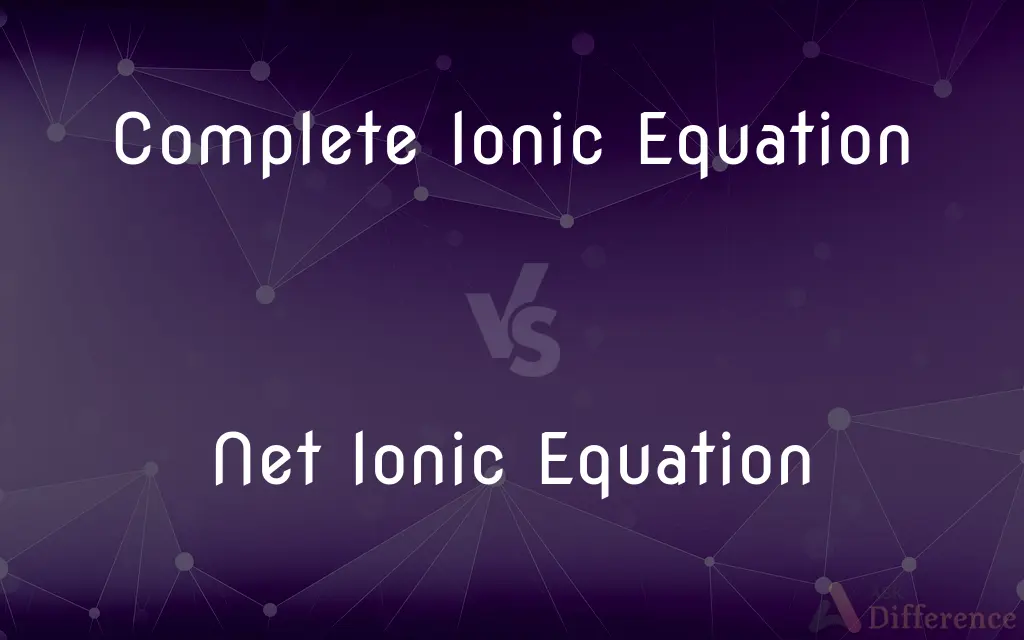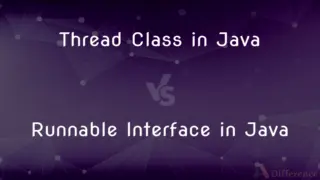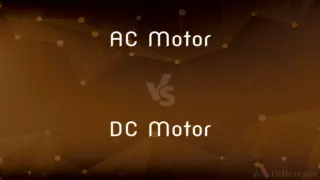Complete Ionic Equation vs. Net Ionic Equation — What's the Difference?
By Tayyaba Rehman — Published on January 6, 2024
Complete Ionic Equations show all the ions present in a chemical reaction. Net Ionic Equations show only the ions that participate in the reaction, omitting the spectator ions.

Difference Between Complete Ionic Equation and Net Ionic Equation
Table of Contents
ADVERTISEMENT
Key Differences
Complete Ionic Equations break down all the soluble ionic compounds into their constituent ions, representing everything present in the reaction mixture, including spectator ions that do not participate in the reaction. In contrast, Net Ionic Equations simplify the reaction by only showing the ions that undergo a chemical change, effectively removing the spectator ions.
In a Complete Ionic Equation, each soluble compound is represented by its ions as they would exist in a solution. This provides a detailed view of all the entities present in the reaction. Net Ionic Equations, however, focus on the essence of the reaction, highlighting the actual chemical change by displaying only the ions that form the precipitate, gas, or a new compound.
Complete Ionic Equations are useful for understanding all the components involved in a reaction, including those that remain unchanged. They give a comprehensive picture of the initial state of the reactants. On the other hand, Net Ionic Equations are more streamlined, offering clarity on what the reaction accomplishes without the clutter of uninvolved ions.
Writing a Complete Ionic Equation requires knowledge of the solubility of compounds and their dissociation into ions. To derive a Net Ionic Equation, one must identify and exclude the spectator ions, focusing on the active participants of the reaction.
While Complete Ionic Equations provide a full representation of the reaction, Net Ionic Equations are often more practical for identifying the actual chemical process taking place, especially in educational or analytical contexts.
ADVERTISEMENT
Comparison Chart
Representation
Shows all ions in the reaction, including spectator ions.
Shows only ions that participate in the reaction.
Focus
On all components involved in the reaction.
On the actual chemical change occurring.
Detail Level
More detailed, showing full ionic breakdown.
More simplified, omitting uninvolved ions.
Utility
Understanding complete makeup of reaction mixture.
Identifying the essence of the chemical reaction.
Complexity
More complex due to more components shown.
Less complex, streamlined to essential components.
Compare with Definitions
Complete Ionic Equation
Shows all ions present in a chemical reaction.
The complete ionic equation detailed every ion in the salt solution.
Net Ionic Equation
Simplifies the reaction to its essentials.
The net ionic equation concisely showed the acid-base neutralization.
Complete Ionic Equation
Represents soluble compounds as dissociated ions.
In the complete ionic equation, sodium chloride was shown as Na+ and Cl-.
Net Ionic Equation
Shows only the ions that undergo a chemical change.
The net ionic equation highlighted the formation of the precipitate.
Complete Ionic Equation
Provides a comprehensive view of the reaction.
Every soluble species was represented in the complete ionic equation.
Net Ionic Equation
Focuses on the active participants in the reaction.
Only the reacting chloride and silver ions appeared in the net ionic equation.
Complete Ionic Equation
Useful for understanding all reactants and products.
To grasp the full scope of the reaction, the complete ionic equation was used.
Net Ionic Equation
Omits spectator ions from the equation.
In the net ionic equation, the inert sodium ions were not included.
Complete Ionic Equation
Includes spectator ions in the reaction.
The complete ionic equation showed the nitrate ions, though they were spectators.
Net Ionic Equation
Ideal for identifying the actual chemical process.
To determine the reaction's outcome, the net ionic equation was analyzed.
Common Curiosities
How are spectator ions treated in Complete vs. Net Ionic Equations?
They are included in complete ionic equations but omitted in net ionic equations.
What is a Complete Ionic Equation?
It's an equation that shows all ions in a chemical reaction, including spectators.
Which equation is more detailed, Complete or Net Ionic?
The complete ionic equation is more detailed.
Is the Net Ionic Equation always simpler?
Yes, it's simplified to show only the reacting ions.
When is a Net Ionic Equation useful?
When you want to focus on the actual chemical change in a reaction.
How do you identify spectator ions?
Spectator ions are those that don't change their oxidation state or form a precipitate.
Are these equations used in both academic and practical chemistry?
Yes, in teaching concepts and in real-world chemical analysis.
How important is solubility in these equations?
Solubility determines ion dissociation, crucial for writing these equations.
Can all reactions be represented by a Net Ionic Equation?
Most ionic reactions can, but it's not applicable for reactions without ion exchange.
Why use a Complete Ionic Equation?
To understand all components involved in a reaction, even those unchanged.
What does a Net Ionic Equation represent?
It represents only the ions that participate in the reaction, excluding spectators.
Can a Complete Ionic Equation be converted to a Net Ionic Equation?
Yes, by removing the spectator ions.
Are both types of equations used in all chemical reactions?
They can be used, but their relevance depends on the nature of the reaction.
Do Complete and Net Ionic Equations differ in balancing?
The balancing principles apply to both, but the components differ.
Does the state of matter affect these equations?
They are most relevant for reactions in aqueous solutions.
Share Your Discovery

Previous Comparison
Thread Class in Java vs. Runnable Interface in Java
Next Comparison
AC Motor vs. DC MotorAuthor Spotlight
Written by
Tayyaba RehmanTayyaba Rehman is a distinguished writer, currently serving as a primary contributor to askdifference.com. As a researcher in semantics and etymology, Tayyaba's passion for the complexity of languages and their distinctions has found a perfect home on the platform. Tayyaba delves into the intricacies of language, distinguishing between commonly confused words and phrases, thereby providing clarity for readers worldwide.












































